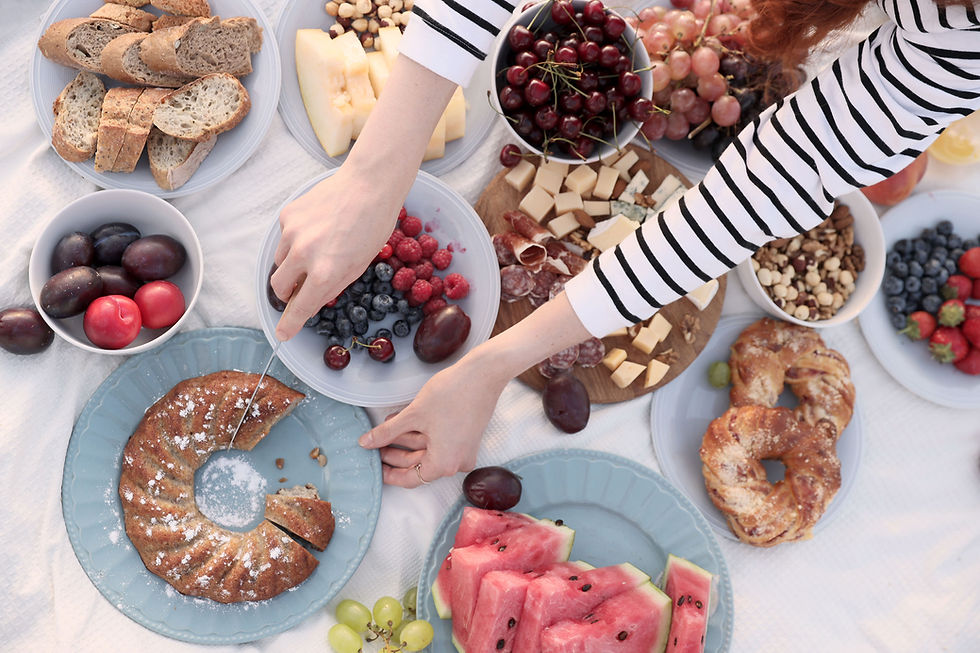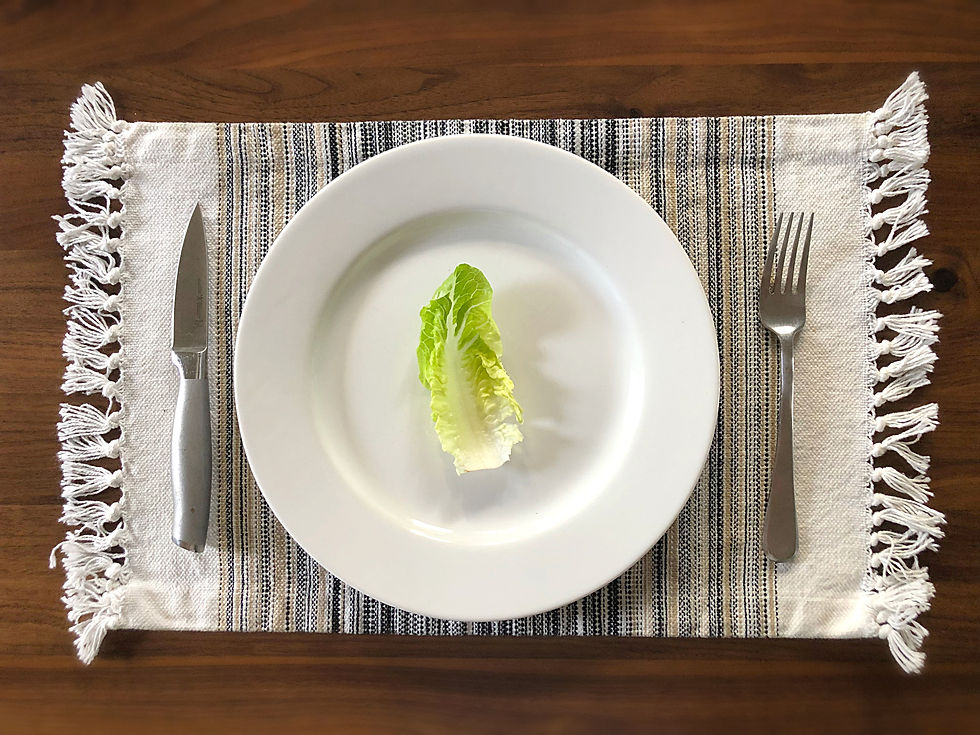5 Steps to Making Peace With Food
- naturallynatalierdn

- Apr 5, 2022
- 7 min read
Updated: Mar 6, 2023
Written by: Natalie Faella, MS, RDN, LDN | April 5, 2022

Last week we talked about what it means to make peace with food or have unconditional permission to eat — an important pillar of intuitive eating. In order to make peace with food, we have to give up all of our food rules so we can truly have the permission to eat what we want, when we want, and however much we want of it.
I know this can sound scary. Rules give us order, structure, and a sense of security or safety, so it is completely normal if you are wary at the thought of dumping all food rules at once, or aren't really sure where to start. The most important thing to remember is that this process can take time, so try to be patient and kind to yourself along the way.
Here are some steps we can take to help us ease into making peace with food:
1. Start with food neutrality.
It can be a large jump to think of every food as “good” or “allowed” when we’ve had some labeled as bad, off-limits, forbidden, or only on the weekends. To do this, it helps to start by removing all food labels, even the "good" ones. Stop assigning foods to a hierarchy or giving them a moral connotation (good vs. bad, clean vs. dirty/toxic), and try to just think of them simply as food. This might sound super easy or obvious (like duh, all food is food), but as we start paying attention to the way we label and feel around certain foods, we might realize we have more deeply rooted judgments than we thought. So take all the time you need with this step.
It's important to note that this doesn’t mean we have to consider all foods nutritionally equal. For example, saying that cookies are nutritionally equivalent to broccoli when we know that broccoli is more nutrient-dense than cookies. (More on this later). It just means that we don’t label cookies as "bad" and broccoli as "good." By taking away the emotionally charged labels, it helps remove the shame and guilt associated with eating the “bad” foods.
It also helps to get rid of the “I’ve been ‘good’ so I deserve to enjoy a ‘bad’ food” mentality and the preoccupation with being “good” that can lead to depriving ourselves, and then overeating said “bad” foods. (Remember that's a biological response to deprivation?) When we remove food labels, we also remove the power these foods can have over us.
To begin with step one, I encourage you to notice how you talk about food with others and to yourself. Where can you be more neutral? What words can you use instead? For instance, maybe using the word “treat” isn’t helpful because it makes you feel like it needs to be earned or feel guilty and overindulgent after eating it. So you let your friend know you’re bringing over "sweets" or "fun foods" for your wine night instead. Or maybe it's no label at all and you just call the food what it is: chocolates, cookies, ice cream, dessert, with no remorse or follow-up of "we can work out tomorrow."
Similarly, instead of thinking: "I feel like crap so I'm going to eat like crap today," what if you say: "I'm not feeling great. I am going to eat what I'm in the mood for and what feels good and comforting today." This way you prevent the next day's remorse and that vow to only eat salads moving forward.
I know this doesn't sound like much, but our words hold so much more power than we think.
2. Know that the goal isn’t to get sick of your forbidden foods.
As we talked about last week, letting go of food rules and practicing food neutrality can initially lead to overeating our forbidden foods. Remember that is a common and biological reaction after having been deprived, especially if we deprived ourselves for a long time. But habituation (or the "getting used to" foods or getting over the allure/hype around certain foods) prevents us from continuing to overindulge in these foods forever.
Learning about habituation is meant to help us realize that we’re not going to turn into pasta-eating zombies and eat no other foods for the rest of our lives after we take pasta off its pedestal and give ourselves permission to eat it. We aren't removing foods from our conditional lists so that we can purposely eat them nonstop, get sick of them, and never want them again. If that were the case, habituation would be some kind of fad diet trend.
We're getting rid of our conditional or forbidden food lists so that all foods are normal, available options that we know we can eat whenever we want. Just by giving ourselves this unconditional permission, we're already decreasing the likelihood of overeating, binging, or only eating those forbidden foods moving forward. This is why the unconditional ability to eat whatever we want, whenever we want, and however much we want sounds scary, but ultimately prevents the things we're afraid would happen if we didn't have food rules.
3. Let go of the idea that there is a "perfect" diet.
So many of my former clients came to me for answers — like I had access to top-secret information about the “perfect” diet. Most of the time they were shocked to find out that I wasn't going to give them a list of what they could and could not eat. Most of them were shocked to hear that they were "allowed" to eat all foods. Then they would say things like “Oh, I can eat pasta? How much? How often?” It was like they wanted to accept that a certain food wasn’t “forbidden,” but still wanted the safety of having rules and regulations around it. Hearing “however much and whenever you want” was not the answer they were looking for, but it is the truth.
This is because there is no “best” or “healthiest” diet out there. There is no perfect ratio of vegetables, proteins, grains, desserts, etc. that we are supposed to abide by each day for optimal health. There are suggestions, like X amount of servings of certain food groups per day, but even those do not make up a universal perfect diet or work for everyone.
We can get so caught up on choosing the "best" and most nutritious food options, thinking that if we don’t it will be detrimental to our weight and health; when in reality, nutrition is a very small piece of the health (and weight) puzzle. There are other factors that weigh more heavily like socioeconomics, access to healthcare, genetics, mental health, stress, sleep habits, etc.
The best diet is the one that meets your needs, preferences, and lifestyle habits. We all have varied nutritional needs, schedules, and accessibility to foods, among other things that make a one-size-fits-all perfect diet impossible. By letting go of the idea that there is a perfect diet you have to strive for, you remove SO much pressure and can start tuning in to learn how eating feels good for you and your body (AKA, intuitive eating).
4. Remember that all foods fit and can have a place in your life.
Have you ever noticed that “moderation” is a nutrition topic not often talked about? Do you see any: “RD Says Everything in Moderation is OK!” headlines? No, you see: “Beware of Added Sugars and Sugar Addiction!”
The diet industry makes money out of fear-mongering messages and providing the idea that "you don’t know how to eat correctly, but if you give us some money we’ll provide the instructions, pre-packaged meals, juices — whatever it is so that you can." In other words, it makes nutrition seem like a much more complicated topic than it is so that you will buy into their proposed solutions to find the "answers." The word "moderation" isn't going to catch your eye, entice you to read their article or post, or create a sense of urgency like those headlines that include warnings, things to "never" eat, or that say: "this is what you're doing wrong, and here is how to fix it."
It is true that all foods are not equally nutritional — you can always find another more nutrient-dense option, but all foods do provide nutrition. Muffins are made with enriched flour, which has nutrients like B vitamins, chocolate or berries, which have antioxidants, eggs, which have protein, and so on. You could argue that scrambled eggs with avocado toast is a more nutrient-dense breakfast choice that will make you feel fuller longer, but maybe you’re in the mood for a muffin as you order your iced coffee on the way to work. There is nothing wrong with opting for the muffin. The satisfaction from eating what you were in the mood for is both physically and emotionally fulfilling, too.
We have to remind ourselves that satisfaction, preference, comfort, celebration, just because, and "I don't need a reason at all" are all just fine reasons to eat something, too. We don't have to choose the very healthiest choice or most "premium fuel" option all of the time. Eating is about so much more than just fueling our bodies.
5. Go easy on yourself.
A lot of us have lived with food rules or strong food beliefs for years, so we cannot expect that they just disappear after one day of practicing food neutrality. This process can take some time and trial and error. Try not to get down on yourself along the way, remember that we are all always works in progress. If not, we're not learning and evolving! Some things that can help:
Reach out to a supportive friend, family member, or coworker who may want to go on this intuitive eating journey with you and practice these steps together.
Clean up your social media feed and remove any accounts that promote food rules and diet culture messages.
Notice where you're receiving other diet culture messages. Is it the magazines in the waiting room of your doctor's office? A coworker on their 4th fad diet this year? The commercials on TV? While you won't be able to avoid them all, noticing when they come up and reminding yourself that these messages do more harm than good can help reduce the impact they have on you.
Follow the social media accounts that promote anti-diet messages and Health at Every Size (HAES).
Reach out to a HAES-aligned health professional for more support.
Subscribe to stay tuned for more on intuitive eating and my anti-diet approach to nutrition, health, and wellness! Follow along on Instagram @naturallynatalierdn and don't hesitate to contact me if you are looking for more support.



Comments